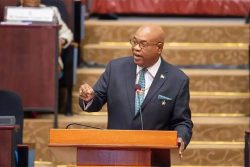Once you read the address delivered by Canada’s High Commissioner to Guyana David Devine at the June 27 Guyana Investment Forum it is difficult to evade the conclusion that its primary purpose was to remind the political administration and the private sector that the criteria for a convivial investment climate goes beyond the framing of laws and regulations. It makes the point that this also goes beyond the ‘open arms’ signals that we sometimes seek to send when we undertake high profile visits abroad to—as we put it—market Guyana.
To leave aside—for a moment—what the Canadian envoy had to say, the government sometimes speaks glibly about the country’s investment climate as though the various audiences are deaf to all of the various ‘messages’ that reach them through what, these days, are significantly enhanced medium of communication.
To return to what High Commissioner Devine said. What he also sought to do was to make it clear to officials of government there present, including President Donald Ramotar, that issues like “the fairness and balance of the country’s regulatory environment” and “social ills such as bribery, lack of transparency and corruption” have to be taken account of in making qualitative assessments of countries’ investment climates.
His presentation made a point of throwing up criteria for determining the quality of an investment climate, which our own high officials perhaps take account of far less frequently than they should. And the Canadian envoy was seeking to deliver a message which—at least as far as this newspaper recalls—is consistent with the posture of zero tolerance of corruption the Canadian authorities usually send to their own private sector companies investing abroad.
It was apparent, from their posture and comments that our own government officials—particularly, it seemed, Finance Minister Dr Ashni Singh—felt that the investment forum was biased in the direction of ‘negatives’ like corruption. In fact, the Finance Minister actually said at the conclusion of the presentation by Caricom official Francis Forbes that he felt there ought to have been more emphasis on the high cost of energy as a barrier to economic progress. However, perhaps in the fullness of time, they will recognise that the investment forum had little if anything to do with energy cost, which, of course, is not to say that a discussion on oil prices do not belong at an investment forum. But they will recognise that it had everything to do with sending an unequivocal message to the government here that external perceptions of Guyana’s investment climate are not necessarily consistent with its own.








